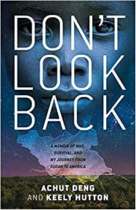
In this propulsive memoir from Achut Deng and Keely Hutton, inspired by a harrowing New York Times article, Don’t Look Back tells a powerful story showing both the ugliness and the beauty of humanity, and the power of not giving up.
Materials from Sudan

In this propulsive memoir from Achut Deng and Keely Hutton, inspired by a harrowing New York Times article, Don’t Look Back tells a powerful story showing both the ugliness and the beauty of humanity, and the power of not giving up.
Sudan, 1980s: Ger Duany knew what he wanted out of life–make his family proud, play with his brothers and sisters, maybe get an education like his brother Oder suggested, and become a soldier for his people when he’s old enough. But then his village was attacked by the North Sudanese military, death kept taking his loved ones away, and being a child soldier was not what he thought it would be. Amid heartbreak, death, and violence, can this lost boy find his way to safety?
In the mid-1980s, Emmanuel Jal was a seven-year-old Sudanese boy, living in a small village with his parents, aunts, uncles, and siblings. But as Sudan’s civil war moved closer – with the Islamic government seizing tribal lands for water, oil, and other resources – Jal’s family moved again and again, seeking peace. Then, on one terrible day, Jal was separated from his mother, and later learned she had been killed; his father Simon rose to become a powerful commander in the Christian Sudanese Liberation Army, fighting for the freedom of Sudan.
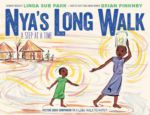
In this picture book based on A Long Walk to Water, a young South Sudanese girl goes on a journey that requires determination, persistence, and compassion.
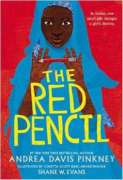
After her tribal village is attacked by militants, Amira, a young Sudanese girl, must flee to safety at a refugee camp, where she finds hope and the chance to pursue an education in the form of a single red pencil and the friendship and encouragement of a wise elder.
Featured in WOW Review Volume IX, Issue 2.
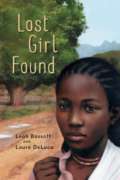
For Poni, life in her small village in southern Sudan is simple and complicated at the same time. But then the war comes and there is only one thing for Poni to do. Run. Run for her life. Driven by the sheer will to survive and the hope that she can somehow make it to the Kakuma refugee camp in Kenya, Poni sets out on a long, dusty trek across the east African countryside with thousands of refugees. In Kakuma she is almost overwhelmed by the misery that surrounds her. Poni realizes that she must leave the camp at any cost. Her destination is a compound in Nairobi. There, if she is lucky, she can continue her education and even one day convince authorities that she is worthy to go to the land of opportunity called America. Even more than the dramatic events of the story, it is Poni’s frank and single-minded personality that carries this novel. In a heartbreaking final twist, she finds her mother just as she is about to leave for the U.S., and must make the hardest decision of all.
Featured in WOW Review Volume X, Issue 4.
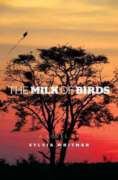
When a nonprofit organization called Save the Girls pairs a fourteen-year-old Sudanese refugee with an American teenager from Richmond, Virginia, the pen pals teach each other compassion and share a bond that bridges two continents.
Featured in Volume VI, Issue 1 of WOW Review.

This book presents accounts of narrow escapes executed by oppressed individuals and groups while illuminating social issues and the historical background that led to wars in Sudan and the orphaned refugees known as the ‘Lost Boys’.
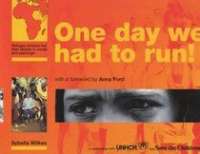
In an anthology of words and drawings compiled by a United Nations relief worker, refugee children from Somalia, the Sudan, and Ethiopia share their feelings about their loss of their homes and their families.
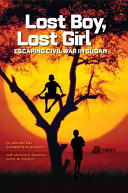
One of thousands of children who fled strife in southern Sudan, John Bul Dau survived hunger, exhaustion, and violence. His wife, Martha, endured similar hardships. In this memorable book, the two convey the best of African values while relating searing accounts of famine and war. There’s warmth as well, in their humorous tales of adapting to American life. For its importance as a primary source, for its inclusion of the rarely told female perspective of Sudan’s lost children, for its celebration of human resilience, this is the perfect story to inform and inspire young readers.
See the review at WOW Review, Volume 5, Issue 2